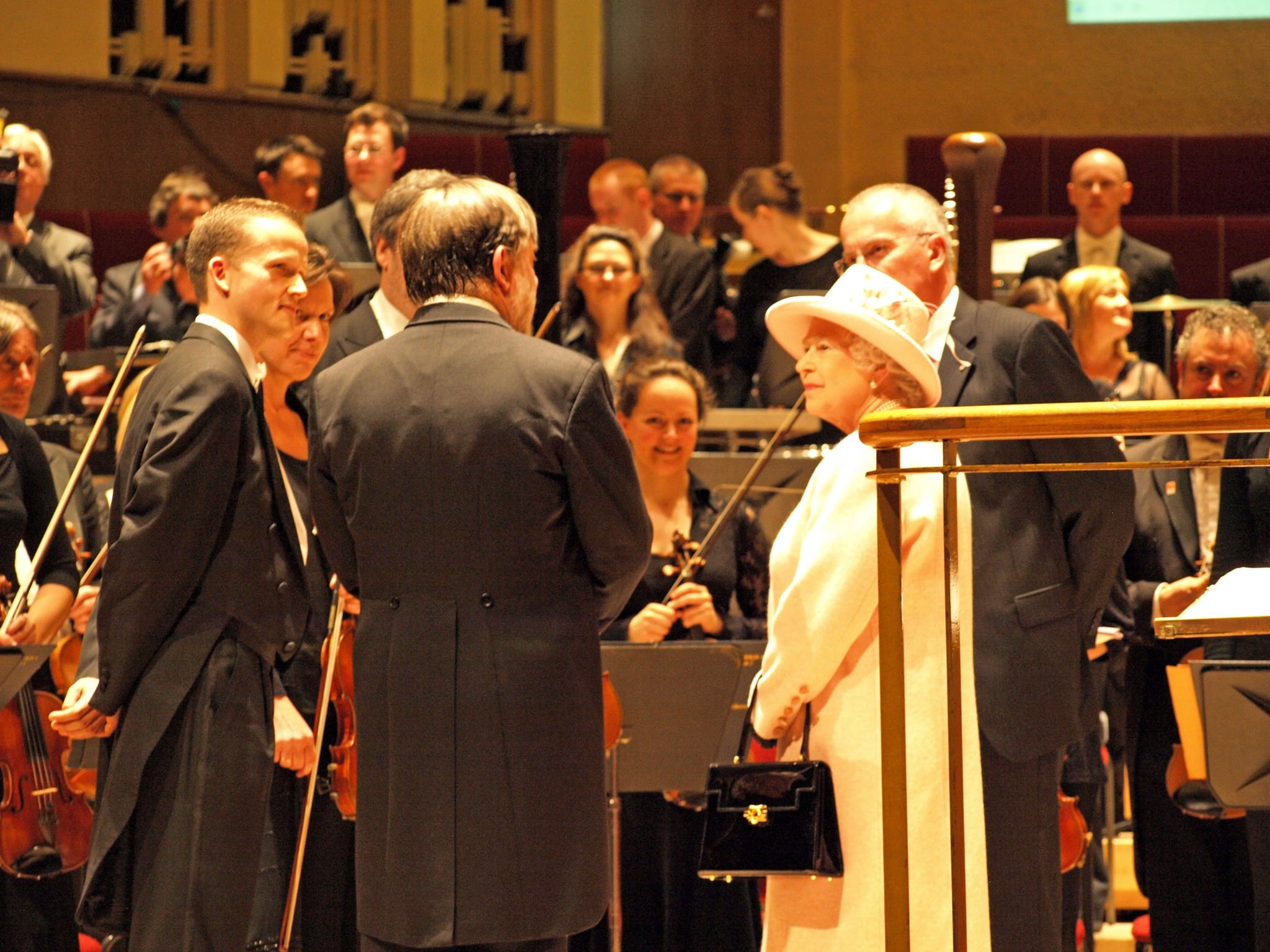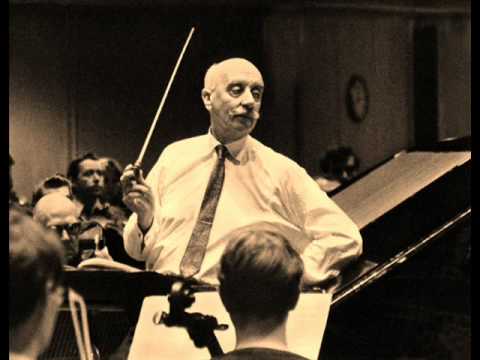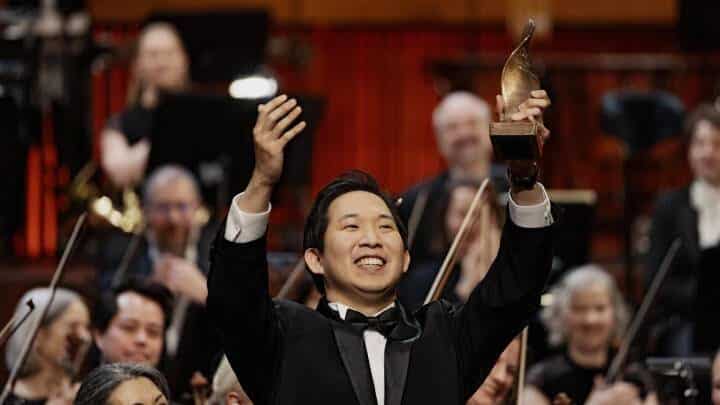Breaking: Bernard Haitink is too frail to conduct today
mainThe venerable maestro, 89, has pulled out of today’s repeat performance of Mahler’s ninth performance with the Concertgebouw Orchestra after suffering an alarming on-stage fall on Friday night while talking applause.
He will be replaced at zero notice by his young British assistant, Kerem Hasan, 26.
We wish Bernard a swift recovery.

Big day for Kerem.





Kerem is a serious talent. I’ve worked with him and he is the biz…one to watch
Um…surely rather too early to make any kind of claim about whether he will end up being “one of the greats”. He must have conducted a professional orchestra in less than 10 concert programmes.
The concert was very, very fine. Mr. Hesan is a indeed a promising conductor. As we all know the orchestra and the hall are both superb and it certainly helped that the orchestra was released by the best conductor in the world, to whom I and everybody else wish a speedy recovery.
Rehearsed not released. Sorry.
Completely agree with Pedro.
A member of the orchestra told me that Haitink had told them yesterday he would conduct today but in the end decided today that he needed some more time. That’s a good sign at least.
The Mahler 9 on Friday night was something else. The orchestra seems to play better for him than for anyone else.
Let’s hope he’ll be back to full physical health soon.
Quite right Stephen, Kerem has impressed hugely, the little I have seen him so far in Cardiff at WNO so far, and I look forward to his future work with the company. Whilst we are all desperately sorry for Mr Haitink and wish him a speedy recovery, every young artist needs an opportunity like this at the start of career.
Bernard Haitink had a huge influence upon me.
When I was young – and as a brass player – Solti/Chicago was shoved down my throat constantly. Now, I’m not in any way running down that particular collaboration, but I will say this much: I never cared for their recordings of Mahler. They struck me as being unmusical. I didn’t know Mahler’s music well at all then, but Solti/Chicago simply failed to make a ‘convert’ of me.
It wasn’t until I explored Haitink, Bernstein and Kubelik on my own, that I fully became hooked on the music of Mahler (each of them very different, as you know). In fact, the first recording that sent ‘over the edge’ was made by the 92 year old Leopold Stokowski – the “Resurrection” symphony with the London Symphony for RCA.
From there, I explored Haitink’s marvelous catalog of Debussy, Ravel, Brahms and even Tchaikovsky. It seemed that the Hatink/Concertgebouw team could do no wrong in those days. I happy that the orchestra always welcomes him back. We all hope the best for him.
Barry:You spoke of Haitink and Kubelick in the same breath. Rightly so! They have a lot in common. A friend of mine that played violin with the Orchestre de Paris told me that his favorite conductors that he personally worked with are/were Haitink, Kubelick and….Bernstein. His least favorite…Solti.
Get well soon, Bernard Haitink. Every performance I have heard by him has been a momentous occasion.
There’s an interesting story you reminded me of. I guess Solti wasn’t happy with French brass, because he asked (assigned?) principal trombonist Jay Friedman to go to Paris and work with Orchestre de Paris’ brass section. When Friedman got back to Chicago, he said something along the lines of, “they should be showing us”.
That story have been embellished over the years, because I’m guessing he probably just stated that they didn’t need any coaching or intervention from American players.
Solti publicly complained about the tone of French brass players and had the trumpets switch from a French to a German brand: Bach, I suppose. A couple of years later, Barenboim brought in the great American horn player Myron Bloom, to change the sound of the horns.
Bach trumpets and trombones are American. They would be fairly similar to the French Couesnon and French Besson trumpets. German trumpets are typically rotary valve ones. The difference in sound isn’t because of the valve type, but because the German trumpets are wrapped differently with a generally ‘faster’ bell taper. Typically, the tuning on them is a bit trickier, so they tend to have more tuning gizmos on-board.
They do use cornets more often in French orchestras, particularly for Berlioz and Massenet. I would say that the sound of the horns (French horns) has changed most dramatically in French orchestras since the ’60s or early ’70s, more so than the trumpets or trombones.
Well, Solti was the chief conductor while the other three were guests. It is easy to like the guest conductor when they are only around for a few days and have no serious decisions to make about the functioning of the orchestra.
My first Mahler 9 live was by Solti and the CSO in 1981 in Lucerne. Brilliantly played but with nothing inside.
What a difference with Karajan’s Bruckner 5 with the BPO in the same festival!
I love Kubelik and Haitink too but to say that Solti does know music is a way too far. Have you listen to Solti Opera recording: Wagner, Mozart, Strauss, Verdi?
Well said. It has become “fashionable” to denigrate the wonderful Sir Georg Solti. I had the great fortune to live near London while he was director at Covent Garden and went to hear him conducting operas or symphonies whenever I could. He was responsible for my lifelong love of Mozart, Wagner, Verdi, Mahler and even (suprise, surprise) Schoenberg. One knew he was a someone special before he even reached the podium.
Nobody here said that Solti did not know music. You’re projecting. Read carefully what was written.
Pedro wrote ” Mahler 9 nothing inside” . This is a sickness of this forum that some participants need in order to praise some conductors to trash others, Solti in this case.
I can’t speak for the concert that Pedro was at.
Solti made two recordings of Mahler 9. His earlier LSO one was quite good, particularly in the first three movements (less effective in the last movement). He recorded it again in Chicago in the mid ’80s. It wasn’t terrible, but neither was it special in any way. To be fair, the digital sound that Decca gave that one was not among their best.
By that point, he had changed the ‘interpretation’ (hate that word) to something that was clone Karajan – not a bad thing, in and of itself, but why not just go with Karajan (who made two terrific recordings of Mahler 9). My take is that when it comes to orchestral music – especially that which involves sonata-allegro form – Solti was usually better in his earlier years. If that’s trashing, then so be it.
I loved working with Solti! Never boring! Okay. He was a maverick, but achieved results. And had a great sense of humour. Has any body on this thread actually worked with him? Or is it the usual armchair critics?
Nobody here was talking about what it was like to work with Solti. Again, this is ‘projecting’. We were talking about very specific music – the results, not whether somebody had a sense of humor or not. I could cite chapter and verse stories in the other direction as well, but I’m not going to stoop to that.
Believe me, the results depend on the conductors humour Barry!
In London yes, in Cleveland…….not so much………….
I notice that Solti is still heavily defended in London. I can understand that because, quite frankly, I think much of his best recorded work was done with the LSO, LPO and Covent Garden Opera. His Munich stuff is pretty good too. I think the Solti/Chicago collaboration was fine for the first decade and a half. After that, I don’t think the orchestra was gaining from it, musically speaking (box office wise, yes – of course). I won’t go into what a former principal of that orchestra told me during Solti’s late years, because there’s really no need for that. It wasn’t flattering and what he said wasn’t surprising to me, just based what I was hearing from the orchestra myself (musically).
I think it’s fair to say that beginning in the latter ’70s, there’s a reason that Chicago recordings with Giulini, Levine and Barenboim (yes, Barenboim – particularly for Schumann and Bruckner) were garnering critical acclaim.
Are there exceptions to what I’m saying? . . . of course. The recording he made of Liszt’s “Faust Symphony” from the latter 80’s was quite good, as was the Vienna Philharmonic “Frau ohne Schatten” (a recording Decca spent over a million dollars on!). There are some pockets of goodness, here and there, but I believe it’s fair to say that when it comes to orchestral music, his earlier achievements were generally better. Generally!
Barry Guerrero writes: “Solti is still heavily defended in London”
I think the key achievement of Solti was to take the Royal Opera House into the top rank of Opera houses, which it wasn’t when he took over at the beginning of the 1960s. And this really was a remarkable achievement which London audiences rightly appreciated. (Earlier reviewers in London described him as having “flogged the music”). He also helped restore the reputation of Chicago during his early years there. By the 1980s he was quite an old man, but still “flogging the music”.
“He also helped restore the reputation of Chicago during his early years there”
Yes, but that was utter nonsense and hype. If you listen to the Martinon/Chicago recordings, you’ll hear that the orchestra sounded fabulous – and truly musical. Claudia Cassidy was greatly responsible for giving the impression that the orchestra was hurting.
Forgot to add….Kerim is excellent. And Haitink the best of them all.